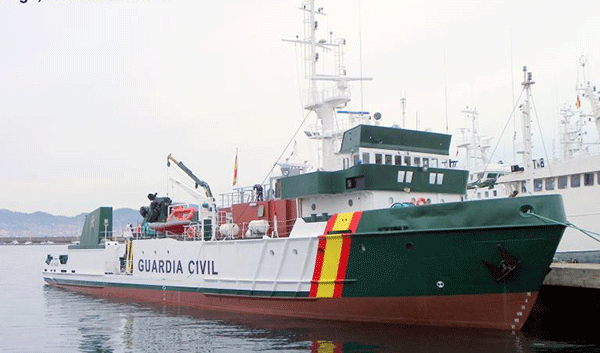Repatriation of 168 Migrants to Dakar

For 5 days, they were held in the Spanish Civil Guard’s « Rio Tajo » ship in appalling conditions because of the Mauritanian government’s refusal to let them disembark. 168 migrants who were intercepted by the Spanish Civil Guard on August 24 in Mauritanian waters, left the Gulf of Nouadhibou to reach Dakar where they are expected this Tuesday evening. Disappointment must mingle with relief, because it is the end of a dream.
They were blocked for several days right next to theirs. A few miles from their country. 168 Senegalese, candidates for irregular immigration, were detained from August 24 to 28 aboard a patrol boat of the Spanish Civil Guard, at the level of the Gulf of Nouadhibou. But, they must have breathed a huge sigh of relief yesterday despite the disappointment of returning home after trying the European adventure without success. Reached by telephone yesterday evening, the Director General of Senegalese Abroad (Dgse) announced that they were able to leave the Mauritanian port yesterday afternoon. “They are expected tomorrow (today) in Dakar”, notes Amadou François Gaye. They are aboard a Navy patrol boat.
Migrants Rescued in Cape Verde: Sadness and Despair
For now, no one knows the motivations of the Mauritanian authorities, who refused to allow them to land on their soil. As living conditions continued to deteriorate inside the boat named Rio Tajo, which intercepted these migrants about 150 km from the Mauritanian coast. Their purpose? Join the Canary Islands. “The Mauritanian authorities had categorically refused to dock the boat, carrying no less than 168 migrants on board. Unfortunately, despite talks between the Spanish and Mauritanian authorities, no agreement was reached to resolve this delicate situation for several days. However, there was an unexpected twist. Finally, the boat in question decided to head for Senegal. The rumours circulating did not seem so crazy since an agreement would indeed have been concluded between the Senegalese authorities and the Spanish officials to allow the docking of the boat”, notes another source involved in the fight against irregular immigration.
Case of the Fass Boye Canoe : 37 Survivors Brought Back to Dakar, the Dead Buried in Sal
Obviously, it took the interventions of the Minister of the Interior and the Spanish ambassador in Dakar to settle the situation. « We don’t know why the ship was blocked, » admits the Dgse.
Behind the negotiation scenes
You should know that the outcome allowed these men to regain some dignity. Because living conditions had become execrable: to protect themselves from the scorching sun, awnings had been improvised. Candidates did not have access to toilets or showers. What about food? It’s not as famous. Inside the boat, the tension had become palpable. On Saturday, crew members fired in the air in an attempt to suppress possible riots, notes Infos migrants. They were provoked by the non-respect of the hunger strike, which had been organized to push the Spanish and Mauritanian leaders to look into their case. This rise in tension prompted the Spanish authorities to reinforce the security of the patrol boat: 16 armed agents from the Spanish maritime service came to support the 20 people from the Civil Guard.
You should know that Madrid and Nouakchott signed agreements in 2016 as part of the fight against irregular immigration. Spain pays more than 10 million euros each year to Mauritania to help it stem the wave of migration, as its waters have become a corridor to the Canary Islands. This agreement gives the Spaniards the right to intervene on its territory to block the way to the candidates for the perilous journey. According to Infos migrants, they positioned on Mauritanian territory, two ships, a helicopter and a land patrol.
By Bocar SAKHO / bsakho@lequotidien.sn

